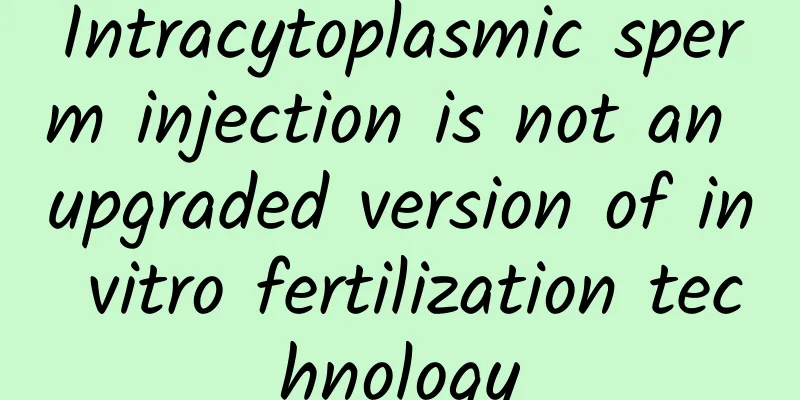Intracytoplasmic sperm injection is not an upgraded version of in vitro fertilization technology

|
Author: Xu Liqing, Liu Dun, Li Zitao, Guangdong Provincial Maternal and Child Health Hospital Reviewer: Liu Fenghua, Chief Physician, Guangdong Provincial Women and Children's Health Hospital In some infertile couples, the wife has no problem, but the husband has the problem. In modern society, many men are under heavy pressure. Coupled with irregular work and rest schedules and unhealthy diet, they may have some problems in their bodies. Some problems are reflected in their fertility, manifested as severe oligospermia, asthenospermia and teratospermia. In this case, if you are still unable to conceive after medication, you can consider using intracytoplasmic sperm injection (ICSI) technology to assist pregnancy. Figure 1 Copyright image, no permission to reprint 1. About ICSI Technology ICSI technology is a commonly used auxiliary method in reproductive medicine, which can help couples who cannot conceive naturally to realize their wish of becoming parents. The entire operation process of ICSI technology is completed in the embryo culture room. The embryologist uses a micromanipulation system to select a normal-shaped sperm, and then injects it into the cytoplasm of the egg through a glass tube thinner than a hair to complete the fertilization process. The operation of ICSI technology involves a series of steps including sperm movement, acrosome enzyme release, granulosa cell digestion, sperm-egg binding, and zona pellucida reaction. It greatly reduces the sperm count requirement for egg fertilization (from millions to single digits) and is currently the most effective treatment for severely infertile men. The main feature of ICSI technology is to manually select suitable sperm and directly inject it into the egg to complete the fertilization process. This operation overcomes the difficulties of sperm and egg free love and combination caused by too few sperm, too poor motility, and too high deformity rate, and can effectively help these men solve infertility problems. In other words, if the wife's inability to conceive is due to serious male factors, then ICSI technology can be used to achieve the purpose of conceiving a life. The difference between IVF and ICSI Figure 2 Copyright image, no permission to reprint Regarding IVF technology, many patients think that they are all the same. In fact, there are differences in IVF technology. According to the order of appearance, IVF technology is divided into in vitro fertilization (IVF), intracytoplasmic sperm injection (ICSI), preimplantation genetic testing (PGT) and ovum cytoplasm replacement (GVT). Among them, ICSI technology is suitable for infertility caused by severe male factors. So, what are the differences between IVF technology and ICSI technology? 1. ICSI technology is an independent version of IVF technology . IVF technology is the general name for in vitro fertilization technology. It should be emphasized that ICSI technology is not an upgraded version of IVF technology, nor can it replace IVF technology. The two are distinguished based on different patient conditions. ICSI technology and IVF technology are different in indications and are suitable for different groups of people, but ICSI technology appeared more than ten years later than IVF technology. 2. ICSI technology and IVF technology have different fertilization methods after egg retrieval . In conventional IVF technology, eggs and processed sperm are placed in a culture dish with culture medium and incubated together, allowing the sperm army to compete with each other to complete the in vitro fertilization of eggs. To put it in an analogy, IVF technology is equivalent to a free love combination, while ICSI technology is a marriage facilitated by a matchmaker. ICSI technology is that embryologists select a "handsome and pleasing" sperm under a microscope, and directly inject this sperm into the cytoplasm of the egg with micromanipulation techniques, and complete in vitro fertilization through artificial micromanipulation. 3. ICSI and IVF have similar implantation and pregnancy rates . Embryos produced by any one method should not be considered superior to the other. The success rates of these two IVF technologies are similar, and there is no saying that one has a higher success rate. Current research believes that ICSI technology is a proven and safe in vitro fertilization method that does not increase the risk of birth defects in offspring. Simply put, the difference between IVF technology and ICSI technology is that the corresponding patient conditions are different. IVF technology is mainly aimed at infertility caused by female factors and mild male factors, while ICSI technology is mainly aimed at infertility caused by severe male factors. Therefore, if you need to use in vitro fertilization technology, the best option is to choose the right one and follow the doctor's arrangements and treatment. 3. Indications for ICSI There are many factors that lead to infertility, and the indications of in vitro fertilization technology at each stage are different. Not all infertile couples can consider using ICSI technology to achieve successful conception. So, which patients are suitable for ICSI technology? In the relevant documents released by my country's National Health Commission, the indications for ICSI technology can be divided into 8 situations: ① severe oligospermia, asthenozoospermia, and teratozoospermia; ② irreversible obstructive azoospermia; ③ spermatogenesis dysfunction (excluding genetic defects); ④ immune infertility; ⑤ low IVF fertilization rate or fertilization failure; ⑥ abnormal sperm acrosome function; ⑦ the need for preimplantation embryo genetic testing technology; ⑧ fertilization of frozen eggs. From the above content, we can draw a conclusion that infertility caused by severe limitation of male reproductive capacity is the main indication of ICSI technology. It is not like what some patients think, that as long as they want to do it, they can ask the doctor for it. my country's regular reproductive medical centers have very strict control over the indications of ICSI technology. Only when the above indications are met can ICSI technology be selected for assisted pregnancy. Figure 3 Copyright image, no permission to reprint When a couple has children, it is the continuation of life and a testimony of their emotions. If you encounter problems with childbearing, it is recommended to seek help from regular medical institutions in a timely manner. As medicine becomes more and more advanced, assisted reproductive technology becomes more and more sophisticated. No matter which technology is used, the doctor will determine the appropriate treatment plan based on the patient's specific situation. With the advancement of medical technology, I believe that every loving couple can have their own children as they wish. |
<<: How should stroke survivors exercise?
>>: Implementation of recovery and rehabilitation after stroke
Recommend
Can I still have a baby if I have high-risk amniocentesis?
After amniocentesis, if a high-risk situation is ...
Is the ovarian corpus luteum cyst pathological?
The corpus luteum of the ovary is the most obviou...
What are the effects of bathing during menstruation?
Can I take a bath during my menstrual period? I b...
Bleeding again 15 days after menstruation
In our daily life, we often see women who bleed a...
White discharge on both sides of the vulva
The female private parts, because they support th...
No menstruation but blood
Some women may experience bleeding when they are ...
How many days before menstruation is the dangerous period?
During sex, people are usually most concerned abo...
Breast pain before period
In life, many women will experience some changes ...
What is the reason for irregular menstruation in girls?
Nowadays, more and more people come to gynecologi...
Positive for Bacillus leucorrhea
During the routine examination of leucorrhea, if ...
Foods to replenish women's yang energy
Yang Qi is very important for people. If there is...
Why is the ovulation test paper whiteboard just pregnant
If the ovulation test paper shows a white line, i...
Treatments for cervicitis
Cervicitis has brought endless troubles to many o...
Is it good to have confinement in a confinement center?
I believe that many pregnant women will consider ...
Can I eat ginger and garlic during confinement?
When a woman is in confinement after giving birth...









